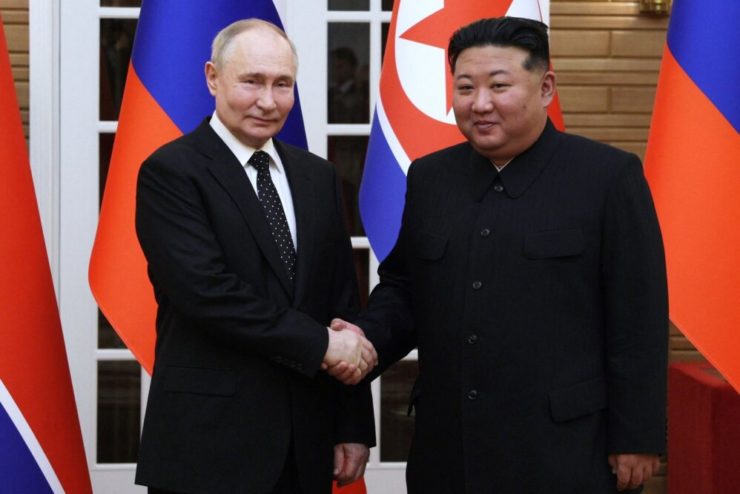
On June 19, 2024, Russia and North Korea signed a landmark defence agreement during President Vladimir Putin’s state visit to North Korea on the invitation of the Supreme Leader Kim Jong Un. The agreement was officially named as “Treaty on the Comprehensive Strategic Partnership.” The contours of the agreement are yet to be published by both sides; however, it can be assessed that it could be like the Article 5 of the North Atlantic Treaty Organization (NATO) Charter, which calls for mutual defence of the NATO members. It is important to note that why the author cited the example of the Article 5 of the NATO Charter. The reason is very simple that because of the NATO expansion at Russia’s doorstep, and the mounting politico-military pressure on North Korea, it is incumbent upon a great power like Russia to ensure the defence of North Korea.
Statements from Leaders
President Putin said that “I agree that this is a true breakthrough document, reflecting the desire of the two countries not to rest on their laurels, but to raise our relations to a new and qualitative level.” He also said that “Russia and the DPRK pursue an independent foreign policy and do not accept the language of blackmail and dictatorship.” The President’s statement is very clear and helps in understanding the mutual challenges faced by both the nations. Besides challenges, President Putin seems adamant in turning the challenges into opportunities beneficial for both nations. There is no doubt that Russia and North Korea are pursuing independent foreign policies and have repeatedly declined to submit to the West. It is also true that despite tremendous international pressure, Russia has defied the West, especially in Syria. And the North Korea has remained steadfast regarding its nuclear programme.
Historical Context
The North Korea, also known as the Democratic People’s Republic of Korea (DPRK), and the former Soviet Union, have a long glowing history of bilateral cordial relations. Besides sharing a borderline with each other, there were a number of reasons which brought them closer. After the World War II, the West’s imperialism and its desire to install a puppet regime in the South Korea was the chief element behind the strategic cooperation between the two nations. The Soviets extended very generous assistance to the North Koreans to defend their country against the West’s aggression. It was Soviet Russia’s diplomatic, political, and military help that ensured the establishment of North Korea during the Korean War. Since 1953, after the temporary armistice between the North and South Korea, Russia has maintained a very firm and righteous position on the North Korea and the reunion between the two Koreas. In 1961, the Soviet Union and North Korea signed the Treaty of Friendship, Cooperation and Mutual Assistance, and the current agreement can be said as the extension of the past. In 2000, both countries also signed “Treaty of Friendship, Good Neighborliness, and Cooperation.”
Strategic Benefits
The recently signed Treaty on the Comprehensive Strategic Partnership is a wise step in the right direction. Arguably, Russia has successfully established an ally in the West Pacific that could help Russia in power projection. Likewise, since South Korea has been supplying arms to Ukraine to fight Russia, the agreement would also enable Russia to keep a check on South Korea.
On the other hand, the North Koreans could benefit a lot from Russia, while remaining within the ambit of this treaty. For instance, North Korea needs investment in its economy and the Russian oil could help a lot. Similarly, Russia’s technical know-how regarding ballistic missiles could be useful for the North Koreans. Also, North Korea could seek Russia’s long-range anti-air missile systems, including the S-300 and S-400. Most importantly, the North Koreans are likely to benefit from Russia’s nuclear technology and could strengthen their nuclear capability manifold.
On March 29, 2024, Russia vetoed a United Nations (UN) resolution that called for investigating North Korea’s so-called violations of the sanctions imposed by the UN Security Council. The Russian Ambassador to the UN Vassily Nebenzia made important observations and said that the UN Security Council sanctions are becoming obsolete and irrelevant to North Korea’s nuclear and ballistic missile programme. Ambassador Nebenzia also defied the attempts made by the United States and its allies to strangle North Korea and compared it with Russia’s national security.
Conclusion
The Russia-North Korea Treaty on the Comprehensive Strategic Partnership is a ray of hope for the countries intending to pursue an independent foreign policy and for those who aspire not to succumb to the West. With Russia’s preemptive diplomatic move, any military attack on North Korea would result in retaliation from Russia, and vice versa. It is just a matter of time, and now we have to wait for more like-minded countries which could follow the footsteps of Russia and North Korea.
It is high time for the West to rethink its Russia policy. In spite of intense politico-diplomatic pressure of the West, nations around the globe are developing a strong desire to pursue an independent foreign policy. One can take the example that it is a positive sign that North Korea has fully endorsed Russia’s Special Military Operation in Ukraine and has expressed unconditional support in this regard. It is evident that Russia’s diplomacy is working and is continuously countering the disinformation and propaganda. In the foreseeable future, we are likely to witness a number of African countries to conclude such agreements with Russia for mutual benefits.
Simon Westwood – is a Masters student at the Dublin City University (DCU), Ireland. He is also a Research Assistant at the DCU’s Department of History, exclusively for the online magazine “New Eastern Outlook”.
